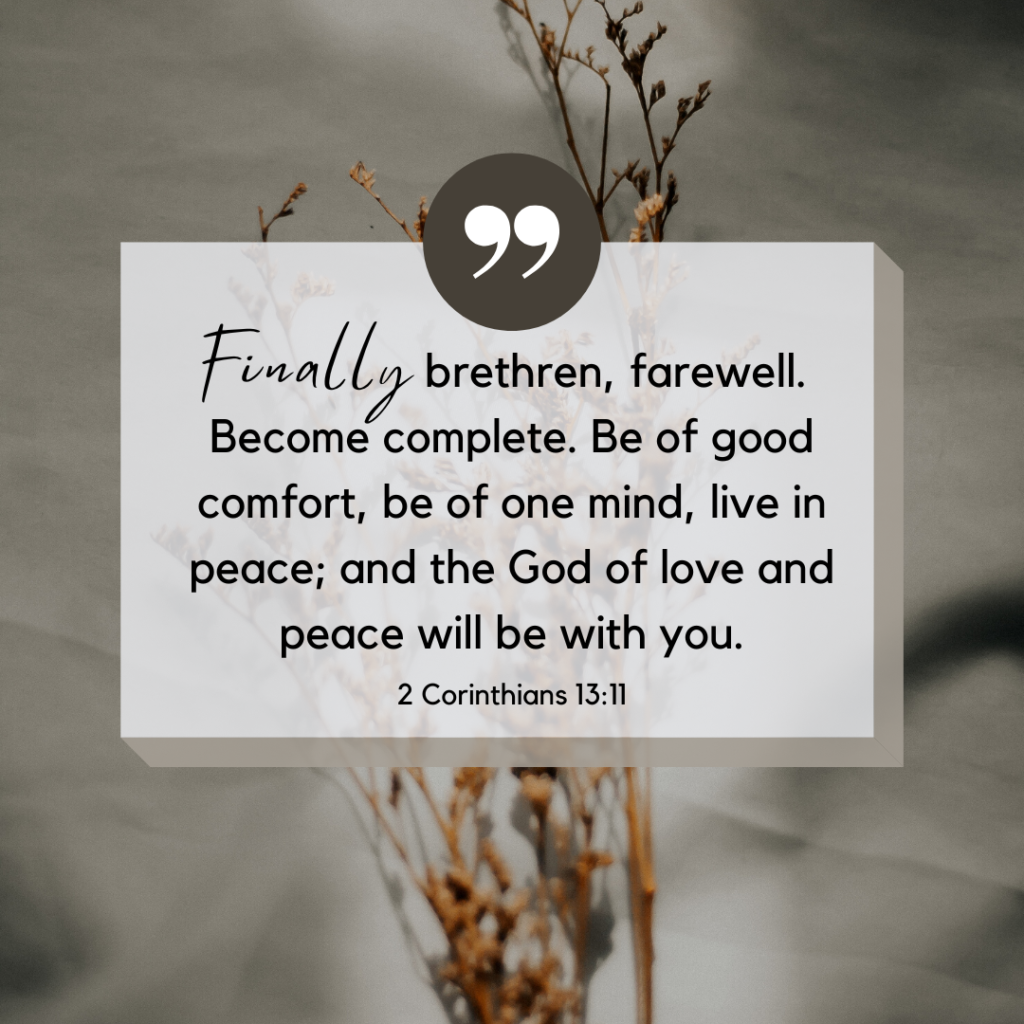2 Corinthians Chapter 13

Finally…
“Finally, brethren, farewell. Become complete. Be of good comfort, be of one mind, live in peace; and the God of love and peace will be with you.” (2 Corinthians 13:11)
The word ‘finally’ temporally denotes the coming of an end. In Paul’s epistles, there are six mentioning of the word ‘finally’. 2 Corinthians 13:11 is the first of the six. The other ‘finallys’ are found in Ephesians 6:10, Philippians 3:1, Philippians 4:8, 1 Thessalonians 4:1, and 2 Thessalonians 3:1. Before the last full stop, ‘finally’ allows the author to sum up important points to remind the reader the gist of his message. These ‘finallys’ are pointers that signal important messages that Paul wanted to convey to the churches spread across Europe and Asia during his time.
Paul’s epistles were written with different readerships in mind. For instance, the epistle of 1 Corinthians was written specifically to accentuate the weaknesses of the church in Corinth, such as sexual immorality, incest, idolatry, members suing each other in court, and meddling with holy sacrament. In the epistle of 2 Corinthians, Paul had to defend and assert the authority of his apostleship in the face of growing criticisms from within the church. There is therefore a sense of urgency and sternness in Paul’s voice.
In contrast, the epistles to the Ephesians was originally a circular letter sent to several congregations in the province of Asia, where Ephesus was the capital. The exhortation in the letter is therefore lot more general (of course, all of Paul’s letters eventually became circular letters read by all churches). Established during his second missionary trip, the church in Philippi was the first church established in Europe (present day Greece), consisting predominantly of gentiles of multiple ethnicities and social classes. The epistle written to them was a joyous one in which Paul expressed his gratitude for their generous provision and partnership in servitude.
Situated about 100 miles (160.9 kms) away from Philippi was Thessalonica, one of the wealthiest trade centers of the Roman Empire. It was also the capital and the largest city of the province of Macedonia with a population of 200,000. Paul and Silas first evangelized there upon seeing the vision of a man from Macedonia inviting them to go there (Acts 16: 9 and 10). Lydia, the seller of purple clothes (Acts 16:14-15), the jailor (Acts 16: 31-34), and perhaps the girl who was once possessed (Acts 16: 16-18) were its early believers.
Despite the divergent readerships, ‘finally’s signpost Paul’s ultimate desire for the believers. Whether he was in a difficult relationship with the members or rejoicing over their improvement, ‘finally’ is an expression of Paul’s hope and good will for those he had begotten through the gospel. What then are his desires for the believers of his time and, by implication, of present time? Let us take a look at these verses that begin with ‘finally’:
Finally, my brethren, be strong in the Lord and in the power of His might. Put on the whole armor of God, that you may be able to stand against the wiles of the devil (Ephesians 6: 10-11)
Finally, my brethren, rejoice in the Lord…. Beware of dogs, beware of evil workers, beware of mutilation! (Philippians 3: 1-2)
Finally, brethren, whatever things are true, whatever things are noble, whatever things are just, whatever things are pure, whatever things are lovely, whatever things are of good report, if there is any virtue and if there is anything praiseworthy–meditate on these things (Philippians 4:8).
Finally then, brethren, we urge and exhort in the Lord Jesus that you should abound more and more, just as you received from us how you ought to walk and to please God; for you know what commandments we gave you through the Lord Jesus (1 Thessalonians 4: 1 and 2).
Finally, brethren, pray for us, that the word of the Lord may run swiftly and be glorified, just as it is with you (2 Thessalonians 3: 1).
In summary, these ‘finallys’ point towards the following:
- Be strong in God’s power, not by our own strength but by the armors he has given us.
- Rejoice in the Lord and be discerning.
- Meditate on things beautiful–things that are virtuous, praiseworthy, noble, just, pure, and of good report.
- Abound more in our walk of faith and in pleasing God
- Pray for the workers of God so that God’s words may be well received
Finally, to further sum up all the ‘finallys’, be strong, rejoice, meditate, abound in good work, and pray.
You May Also Like
